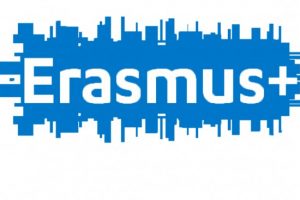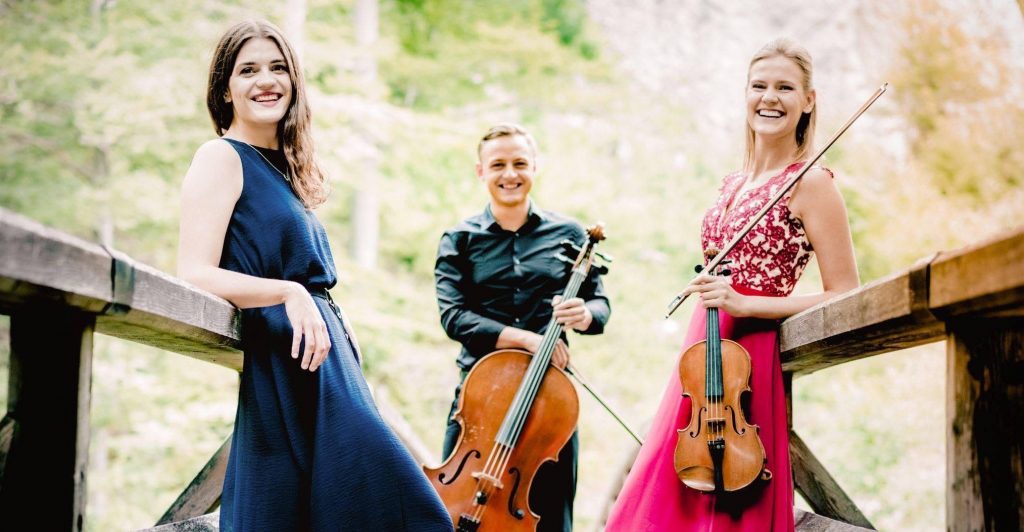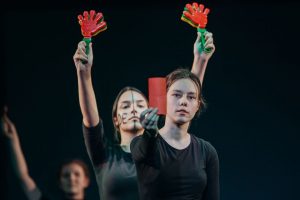Paieška : ecmaster
Chamber ensembles are welcome to apply for joint programme ECMAster!
Established chamber ensembles are very welcome to apply for the unique joint masters’ programme ECMAster!
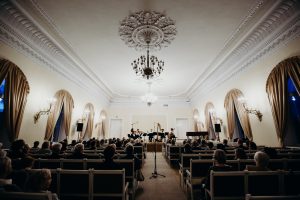 The programme ECMAster is developed and implemented by seven European higher education institutions in the Hague, Fiesole, Manchester, Oslo, Paris, Vienna, Vilnius. Registration is now open, deadline for applications is February 22 of 2021. Entrance exam will take place on March 12 via zoom.
The programme ECMAster is developed and implemented by seven European higher education institutions in the Hague, Fiesole, Manchester, Oslo, Paris, Vienna, Vilnius. Registration is now open, deadline for applications is February 22 of 2021. Entrance exam will take place on March 12 via zoom.
More information about ECMAster and entry requirements: https://lmta.lt/en/english-lmta-welcomes-foreign-students/english-joint-programme-ecmaster/
2021 02 03
Apply now! ECMAster admission to the LMTA in Vilnius
Lithuanian Academy of Music and Theatre invites young chamber ensembles to study the joint programme European Chamber Music Master – ECMAster. As an EMCAster student, you receive advanced training in chamber music performance, study with inspiring professors at leading institutions in different European countries, and refine your musical presentation, communication and technical skills as an ensemble musician.
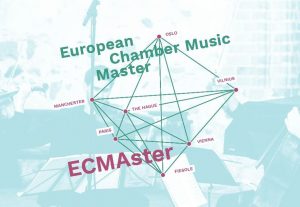 Application is open, entrance exams in Vilnius – on March 16th of 2020. More information you can find HERE.
Application is open, entrance exams in Vilnius – on March 16th of 2020. More information you can find HERE.
Application deadline – February 15th: APPLICATION FORM.
Who is eligible?
The programme is open to established ensembles with a standard instrument combination (with a minimum of three ensemble members):
– String quartets
– Piano trios
– String trios
– Piano quartets
– Wind quintets
– 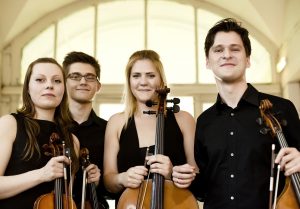 Brass quintets
Brass quintets
– Saxophone quartets
– Other ensembles (see the General programme description for more information)
Eligibility requirements:
– Member of an established ensemble
– All Ensemble Members must apply at the same institution
Joint admission criteria
All applicants must possess the skills and experience listed below at a level sufficient for them to meet the requirements of this programme of study both individually and as an ensemble.
Applicants must:
– demonstrate advanced instrumental and musical abilities
– possess the relevant skills and experience in chamber music
– and prove their ability to independently make and reflect upon their own artistic decisions.
Application procedure
Submit application to the chosen institution containing a CV, a description of the ensemble’s activities and a master project proposal. Please observe carefully possible additional requirements by the institution!
Audition
– A prepared ensemble program of 60 minutes of at least three contrasting works or movements in different styles relevant for the ensemble type
– An interview
Chair of Admission Jury – professor Patrik Jüdt, Bern University of Arts, Switzerland.
Contact persons ECMAster in Vilnius:
– Indrė Baikštytė, indre.baikstyte@lmta.lt, +370 651 29059
– Rima Rimšaitė, rima.rimsaite@lmta.lt, +370 699 54765
2020 01 17
The Erasmus Charter for Higher Education 2021-2027 given to the LMTA
The new Erasmus Charter for Higher Education 2021-2027 is given to the Lithuniana Academy of Music and Theatre. The number of the charter: 64152-EPP-1-2014-1-LT-EPPKA3-ECHE.
European Policy Statement of LMTA
2021 01 13
Joint Programme ECMAster
JOINT PROGRAMME European Chamber Music Master – ECMAster
Programme duration: two-year full-time study, 120 ECTS
Language of instruction: English
Application deadline: February 12, 2024
Audition in Vilnius*: March 25, 2024
* The entrance examination could also take place remotely. Please upload the audition programme video to YouTube and send us the URL/link by email. The interview will take place via Zoom / Microsoft Teams.
For more information please contact Prof. Dr. Indrė Baikštytė
E-mail indre.baikstyte@lmta
The ECMAster (European Chamber Music Master) is a two-year joint programme on the master level for pre-existing chamber music ensembles. It is operated by seven leading higher music education institutions in Europe in close collaboration with ECMA (European Chamber Music Academy), an association of European music universities, conservatoires and festivals.
By tailor-made curricula, the ECMAster enables the students to develop their specific artistic, technical, reflective and social skills and to act as strong, independent and innovative ensemble musicians who can meet the high professional demands in tomorrow’s music scene. The admitted chamber music groups will take advantage of the expertise, culture and tradition of three separate music institutions. During the two years of advanced study, two obligatory exchange semesters at two different host institutions will be supported by Erasmus+ mobility funds. In addition, the ensembles will also participate in at least six ECMA sessions and get access to a European network in the profession of chamber music.
The programme is designed for already established chamber ensembles; therefore, students have to commit to working together during the entire duration of their studies.
PARTNERS:
Conservatoire national supérieur de musique et de danse de Paris (France),
Fondazione Scuola di Musica di Fiesole Onlus (Italy),
Koninklijk Conservatorium Den Haag (the Netherlands),
Lietuvos muzikos ir teatro akademija, Vilnius (Lithuania),
Norges Musikhøgskole, Oslo (Norway),
Royal Northern College of Music, Manchester (the United Kingdom),
Universität für Musik und darstellende Kunst Wien (Austria),
European Chamber Music Academy ECMA (Austria).
Course Catalogue
Course catalogue for regular students available in English:
BACHELOR’S STUDIES:
DANCE:
Classical Dance
Contemporary Dance
MUSIC PERFORMANCE:
Accordion
Choir Conduction
Conducting and Organ Studies
Harpsichord
Jazz
Jazz and Popular Music
Organ
Piano
Symphony Orchestra Conducting
String InstrumentsString Instruments (Guitar)
Vocal Performance
Wind and Percussion Instruments
Wind Orchestra Conducting
MUSIC STUDIES
Composition
Electronical Music
Music and Education
MASTER’S STUDIES:
COMPOSITION (MA):
Academic Composition
Digital Technologies
MUSIC PERFORMANCE:
Accordion
Baroque Opera
Choir Conducting
Vocal Performance
Jazz
Jazz and Popular Music
Wind Orchestra Conducting
Symphony Orchestra Conducting
ECMAster
Piano
Chamber Ensemble
Orchestral Music
Chamber Vocal Performance
Harpsichord
Piano Accompaniment
String Instruments
Wind and Percussion Instruments
Contemporary and Improvisational Music
Organ
Study programmes
COMPOSITION
Aim of the study programme is to train a highly qualified composer of academic composition or digital technologies (electronic music) who knows the theory and practice of composition, the basics of artistic research, has very good skills in instrumentation, electronic and computer music creation and is able to professionally implement instrumental and/or electronic music-related creative projects, continuously improve themselves and study individually.
|
SPECIALISATIONS: Academic Composition, Digital Technologies |
|
DURATION, STUDY VOLUME: 2 years, 120 ECTS |
|
QUALIFICATION: Master of Arts |
|
TUITION FEE: 6920,9 Eur* |
* Non-EU citizens and all students who do not receive state-funded support for studies must pay a yearly tuition fee fixed by the Academy’s Senate. Depending on the year of entry, prices may change.
Possibilities for further studies
After successfully completing the second cycle study programme Composition and obtaining master’s degree in arts, graduate can continue his/her education in doctoral studies in art.
Professional opportunities
Graduates are able to work in the field of creative and artistic research in cultural, music education, science, concert and other institutions related to artistic activities, in the fields of culture and music industry (advertising, sound recordings, etc.) and other creative organisations, and participate in art projects and perform other work requiring the competences of a composer.
MUSIC PERFORMANCE
The aim of the Music Performance study programme is to train mature music performer who has formed his/her artistic individuality, is familiar with the development of musical culture, the traditions of the practical aspect of the chosen specialisation, the means of musical expression and the possibilities of interpretation, and is capable of conducting artistic research, creating original works and influencing the development of art, culture and artistic education in the country and abroad with the expressed high-level artistic, creative ideas and insights.
Master’s student, combining the experience of the art practice with art research, improve his/her individual competencies of a music performer acquired in bachelor’s studies, develops independent concert activities, develops intelligence and expand erudition, develops the ability to work and learn independently, and improve constructive and reasoned business communication and leadership skills.
|
SPECIALISATIONS: Jazz, Symphony Orchestra Conducting, ECMAster, Harpsichord, Wind and Percussion Instruments, |
|
DURATION, STUDY VOLUME: 2 years, 120 ECTS |
|
QUALIFICATION: Master of Arts |
|
TUITION FEE: 6920,9 Eur* |
* Non-EU citizens and all students who do not receive state-funded support for studies must pay a yearly tuition fee fixed by the Academy’s Senate. Depending on the year of entry, prices may change.
Possibilities for further studies
Graduates of the Music Performance study programme can continue their education in doctoral studies in the field of Art.
Professional opportunities
Graduates are able to work as music performers in art groups, independently initiate and develop creative activities, conduct art research, engage in educational and expert activities, lead music groups, and work as pedagogues in higher education institutions, children’s art schools and conservatories.
Curriculum
PROGRAMME STRUCTURE
Ensembles apply at one of the partner institutions and after successful entrance examinations are enrolled into the programme at this institution which is considered as the home institution. ECMAster students spend semesters 1 and 4 at their home institution and semesters 2 and 3 at two different host institutions. Two exchange semesters at partner institutions and participation in joint intensive modules (ECMA sessions) are obligatory:
- Semester 1: Home institution
- Semester 2: Potential host institutions: Fiesole, Manchester, Oslo or Vienna
- Semester 3: Potential host institutions: Paris, The Hague or Vilnius
- Semester 4: Home institution
Each ensemble is appointed a principal artistic supervisor from the home institution and artistic supervisors from each host institution.
ECMA SESSIONS
Ensembles are committed to attend a minimum of six ECMA sessions within the two years, normally one session in semesters 1 and 4, and two sessions in semesters 2 and 3. In semesters 2 and 3, one of the sessions will be at the host institution. In semesters 1 and 4, the ensemble will participate in the session at the home institution.
LMTA AS HOME INSTITUTION
ECMAster students entering the programme at the Lithuanian Academy of Music and Theatre (LMTA) will benefit from a wide range of performance opportunities as well as 68 hours of chamber music lessons and 34 hours of solo instrument lessons by the best chamber musicians and featuring soloists. ECMAster students follow the programme at LMTA as a home institution during the first and the last semester while studying at two different host institutions during the two other semesters:
- Semester 1 – courses offered at LMTA: Chamber Music (15 ECTS), Solo Instrument (5 ECTS), Basics of Research Paper (5 ECTS), Elective course (5 ECTS)
- Semester 2 – courses offered at selected host I institution in: Fiesole, Manchester, Oslo or Vienna
- Semester 3 – courses offered at selected host II institution: Paris or the Hague
- Semester 4 – courses offered at LMTA: Master’s Art Project (15 ECTS), Solo Instrument (5 ECTS), Final Research Paper (15 ECTS)
ECMAster courses taken at the host institutions during Semester 3 and 4 are fully recognized by LMTA as a part of the joint curriculum, information about the courses, credits and results appear on Diploma Supplement and ECMAster Certificate.
LMTA AS HOST INSTITUTION
ECMAster students entering the programme at one of ECMAster partner institutions, may select LMTA as a host institution during Semester 3. Students may apply for Semester 3 in frames of Erasmus+ student mobility programme. Erasmus+ student application deadline is 15th of May. Partner institutions are recommended to nominate ECMAster ensemble by the end of March.
Semester 3 – courses offered at LMTA: Chamber Music (15 ECTS), Solo Instrument (5 ECTS), and two elective courses (10 ECTS).
LIST OF ELECTIVE COURSES
Music Performance Studies (5 ECTS)
Technology and New Media (5 ECTS)
Contemporary Chamber Music and Improvisation (5 ECTS)
Music Performance Management (5 ECTS), to be confirmed in 2019
Lithuanian Ethnic Music Practice (5 ECTS), to be confirmed in 2019
Admission
ELIGIBILITY AND ADMISSION
The programme is open to established ensembles with a standard instrument combination: string quartets, piano trios, string trios, piano quartets, wind quintets, brass quintets, saxophone quartets, and other ensembles.
Applicant must have completed a bachelor‘s degree in music performance or equivalent qualification. Applicant must be a member of an established ensemble, and all ensemble members must apply to the same institution.
Applicant must have advanced instrumental and musical skills; have the relevant skills and experience in chamber music; have the ability to reflect upon and make independent artistic choices.
APPLICATION PROCEDURE
Applications must be submitted to the institutions which is chosen as home institution. Application file must include:
- Application
- Curriculum Vitae containing the applicant‘s relevant artistic activities
- Description of the Ensemble‘s activities
- Documentation of a bachelor‘s degree or equivalent (to be completed before the commencement of the master study)
- Master project proposal
AUDITION REQUIREMENTS
- A prepared ensemble program of 60 minutes of at least three contrasting works or movements in different styles relevant for the ensemble type.
- An interview
Structure
PROGRAMME STRUCTURE
Ensembles apply at one of the partner institutions and after successful entrance examinations are enrolled into the programme at this institution which is considered as the home institution. ECMAster students spend semesters 1 and 4 at their home institution and semesters 2 and 3 at two different host institutions. Two exchange semesters at partner institutions and participation in joint intensive modules (ECMA sessions) are obligatory.
- Semester 1: Home institution
- Semester 2: Potential host institutions: Fiesole, Manchester, Oslo or Vienna
- Semester 3: Potential host institutions: Paris, The Hague or Vilnius
- Semester 4: Home institution
Each ensemble is appointed a principal artistic supervisor from the home institution and artistic supervisors from each host institution.
ECMA SESSIONS
Ensembles are committed to attend a minimum of six ECMA sessions within the two years, normally one session in semesters 1 and 4, and two sessions in semesters 2 and 3. In semesters 2 and 3, one of the sessions will be at the host institution. In semesters 1 and 4, the ensemble will participate in the session at the home institution.
Master’s
MASTER’S STUDIES
2nd cycle, 1.5 to 2 study years, 90-120 ECTS
STUDY PROGRAMME PROFILES:
- Composition
- Music Performance
- Art Reasearch and Communication
- Film Art
- Theatre Art
- Dance Art
STUDY PROGRAMME CURRICULUM / STUDY SUBJECTS DESCRIPTION ⃰
⃰ If you don’t find the study subject description you are interested in, please contact LMTA Erasmus Coordinator and(or) select subject from the Optional subjects list: https://lmta.lt/lt/english-lmta-welcomes-foreign-students/erasmus-and-exchanges-studies/english-exange-students/
COMPOSITION (MA)
Aim of the study programme is to train a highly qualified composer of academic composition or digital technologies (electronic music) who knows the theory and practice of composition, the basics of artistic research, has very good skills in instrumentation, electronic and computer music creation and is able to professionally implement instrumental and/or electronic music-related creative projects, continuously improve themselves and study individually.
|
SPECIALISATIONS: Academic Composition, Digital Technologies |
|
DURATION, STUDY VOLUME: 2 years, 120 ECTS |
|
QUALIFICATION: Master of Arts |
|
PLACE OF IMPLEMENTATION: Vilnius |
MUSIC PERFORMANCE (MA)
The aim of the Music Performance study programme is to train mature music performer who has formed his/her artistic individuality, is familiar with the development of musical culture, the traditions of the practical aspect of the chosen specialisation, the means of musical expression and the possibilities of interpretation, and is capable of conducting artistic research, creating original works and influencing the development of art, culture and artistic education in the country and abroad with the expressed high-level artistic, creative ideas and insights.
Master’s student, combining the experience of the art practice with art research, improve his/her individual competencies of a music performer acquired in bachelor’s studies, develops independent concert activities, develops intelligence and expand erudition, develops the ability to work and learn independently, and improve constructive and reasoned business communication and leadership skills.
SPECIALISATIONS:
|
DURATION, STUDY VOLUME: 2 years, 120 ECTS |
|
QUALIFICATION: Master of Arts |
|
PLACE OF IMPLEMENTATION: Vilnius, Klaipėda |
|
Jazz, |
ART RESEARCH AND COMMUNICATION (MA)
The aim of the Art Research and Communication study programme is to train highly qualified arts and culture professionals to work in the fields of scientific research, the cultural sector, and public information and communication, with the necessary knowledge of art history and communication, and the ability to produce scientific, dissemination, educational, and creative outputs using interdisciplinary approaches.
It is the only postgraduate (master) study programme in Lithuania that combines ethnomusicology, musicology, theatre studies, and film studies, and ensures a close link between theory and practice. The programme opens up a broader range of professional and creative opportunities for students, as well as for further studies or academic careers. Students combine the practical experience gained in their lower-level studies with artistic research.
|
SPECIALISATIONS: Ethnomusicology, Musicology, |
|
DURATION, STUDY VOLUME: 2 years, 120 ECTS
|
|
QUALIFICATION: Master of Humanities |
|
PLACE OF IMPLEMENTATION: Vilnius |
FILM ART
The aim of the Film Art study programme is to train the film art professional who is able to initiate and implement innovative creative film art projects (or parts thereof) independently and/or in a collegiate manner, as well as carry out relevant art research in their field while developing their individual creative style and applying practical and theoretical knowledge and abilities related to directing, producing, cinematography and sound design.
It is the only study programme of its kind in Lithuania in which professionals in the field of cinema (film directing, cinematography, sound design and film production) deepen and expand the knowledge and skills acquired in the first cycle studies by realising a creative film-related project and conducting relevant artistic research in their field. Students are educated by renowned Lithuanian film artists and scientists, and enjoy lectures by visiting lecturers from abroad, who are invited on a regular basis, as well as close cooperation with representatives of the country’s film industry.
|
SPECIALISATIONS: Sound Design, Production, Cinematography, Film Directing |
|
DURATION, STUDY VOLUME: 2 years, 120 ECTS
|
|
QUALIFICATION: Master of Arts |
|
PLACE OF IMPLEMENTATION: Vilnius |
THEATRE ART (MA)
The aim of the Theatre Art study programme is to train a highly qualified theatre artist with knowledge of the principles of theatrical creation, the peculiarities of collective creation, and a researcher with theoretical, methodological and practical knowledge of artistic research, who is able to analyse the creative process and the artistic result, to highlight and solve theoretical and practical problems, to independently and/or collectively realise a creative artistic project of his/her own initiative, based on the individual investigation of a topical and innovative problem, and to find a niche for his/her creative activity (niche).
|
SPECIALISATIONS: Acting, Directing, Applied Theatre, Art Project Directing |
|
DURATION, STUDY VOLUME: 2 years, 120 ECTS
|
|
QUALIFICATION: Master of Arts |
|
PLACE OF IMPLEMENTATION: Vilnius, Klaipėda |
Course Catalogue
The Course Catalogue is an official list of study programmes and courses offered by the Lithuanian Academy of Music and Theatre. The official language of instruction is Lithuanian (LT), but there are a certain number of courses available in English (EN). Information about the course language(s) is indicated in the list.
Exchange students may select courses taught in English from the list of obligatory courses, and from the list of elective courses offered by the Lithuanian Academy of Music and Theatre, Vilnius University, and the Vilnius Academy of Fine Arts.
There are several study programmes partly taught in English and Lithuanian: Music Performance (Bachelor’s, Master’s) and Composition (Bachelor’s, Master’s).
The official language of the joint programme ECMAster (European Chamber Music Master) is English.
International projects
Lithuanian Academy of Music and Theatre is an active partner of international projects – ERASMUS+ Strategic Partnerships projects (ERASMUS+ SP), ERASMUS+ Capacity Building, Creative Europe, Nordplus higher education programme intensive courses and development and other international projects.
Creative Europe project ECMA-Pro (2020-2023): ECMA – European Chamber Music Academy is a leading further education program for young professional chamber music ensembles in Europe: educational institutions and festivals from all over Europe and beyond cooperate in promoting young formations on their way to artistic independence. ECMA Sessions are the central activity. Sessions include international coaching for young ensembles from all over Europe, which take place alternately at the various partner institutions. ECMA Pro cooperation project aims to take the existing ECMA work to another level by adding and proving new formats and activities. Twelve partner institutions from nine different European countries will realize this project cooperatively in the course of the coming four years.
ERASMUS+ SP projects:
• EOALAB (2019-2021): European Opera Laboratory: Competence Centre for Shared Education. LMTA participated in the working group, which is responsible for policy recommendations for opera schools, and organizes as well as participates in the intensive EOALAB courses aimed at testing and development of Experimental Opera Laboratory study module. About the project and partners at www.eoalab.org; larger network of European Opera Schools is the European Opera Academy EOA
• Alexandria Nova (2019-2021): Alexandria Nova is a network of North European directing programs. It aims to create an international and diverse learning environment for the relatively small directing programs of each national institution and make a leap forward in the awareness about pedagogical methods used. We will share and exchange practical and pedagogical knowledge and working methods to gather a broader understanding about the art of directing. This is done through a series of workshops, symposium, seminars including students as well as teachers from all partner-institutions. The goal is to create a vivid interactive digital platform, a new library called Alexandria Nova, where students and teachers share ideas, methods and exercises in a playful way. The network will also publish a book with articles and essays by teachers involved in the project, as well as other artists, scientists and students.
• INTERMUSIC (2018-2020): platform for distance learning of various music disciplines and three pilot study modules of blended and distance courses: Music Theory and Composition, Chamber Music, and Vocal Phonetics in Foreign Languages (Italian, Russian and Danish). Project coordinated by Conservatorio di Musica Giuseppe Verdi, Milano. Partners: Royal Danish Academy of Music, Lithuanian Academy of Music and Theatre and association AEC. More information on project’s website http://intermusicproject.eu/
• ECMA – NEXT STEP (2016-2018): the European Chamber Music Academy – network cooperation and development project. Results – guidlines for higher music education institutions about chamber music teaching/learning, and joint master‘s programme ECMAster. More about the project, partners and the ECMA here www.ecma-music.com/en/
• METRIC (2016-2018): Modernisation of European Higher Music Education through Improvisation. Project results – joint modules, overview of improvisation teaching/learning at partner Institutions, and exercises. More about partners and project results at http://metricimpro.eu
• ECTHEC (2017-2019): Entrepreneurial Challenges to Theatre Higher Education Curricula, coordinated by European network of Theatre Schools École des Écoles. Project description, activities, partners and results here.
Other projects: LMTA has coordinated a number of projects: Nordplus Intensive Course IMMEDIA, NORD+MIX, Nordplus Music Laboratory the PROCESS, Nordplus Intensive Course NOMAZZ meets the Baltics, and hosted intensive courses of ERASMUS+ SP projects INTERMUSIC, EOALAB, and other projects.
Strategic Cooperation
LMTA participation in Erasmus+ Capacity Building projects:
DEMUSIS – Enhancing the Digital Competencies and Entrepreneurship Skills of Academic Musicians in Serbia for Culturally More Engaged Society (2019-2022)
The project is aimed at increasing the awareness of digital and entrepreneurial skills in music education in Serbia. Expected results: 1) modernization of curricula – the new master programme “Music in Digital Environment“; 2) continuous professional development of employees in music sector in Serbia – certified LLL courses; 3) development of digital competencies through entrepreneurship for artistic self-expression and promotion of more engaged and culturally responsible musicians committed to the civil society.
Coordinator: University of Arts in Belgrade (Serbia). Partners: AEC (Belgium), New Bulgarian University (Bulgaria), Lithuanian Academy of Music and Theatre (Lithuania), Koninklijk Conservatorium Den Haag (The Netherlands), University of Kragujevac (Serbia), University of Novy Sad (Serbia), RDU Radio Televizija (Serbia), EIPIX Entertainment Doo Novy Sad (Serbia), Mad Head Games (Serbia).
LMTA participation in Erasmus+ Strategic Partnership projects:
EOALAB – European Opera Academy – Competence Centre for Shared Opera Education (2018-2021)
Goals: to trigger innovation in the field of opera based on the innovative concept of shared education. This project acts as a think tank of the European Opera Academy to jointly elaborate, test and further develop innovative approaches in opera education and training to be disseminated to and exploited by other EOA members as well as other High Education Institutions and associated institutions.
Expected results: manual on shared education; policy recommendations for HEIs in opera training / innovative approaches to opera making; model of blended teaching activities on opera language teaching.
Coordinator: ZUYD University of Applied Sciences – Maastricht Conservatoire (The Netherlands). Partners: AEC (Belgium), Royal Conservatoire Antwerp (Belgium), Conservatorio di Musica Arrigo Boito di Parma (Italy), Jazeps Vitols Latvian Academy of Music (Latvia), (Italy), Lithuanian Academy of Music and Theatre (Lithuania), Instituto Polytechnico do Porto – ESMAE (Portugal), Stockholm University of the Arts – UNIARTS (Sweden).
INTERMUSIC – INTERactive environment for MUSIC learning and practising (2018-2020)
Goals: to create an online shared Platform for the distance learning for music teaching/learning and sharing the best training practices for musicians, joint courses and online projects.
Expected results: development of the open INTERMUSIC platform; staff training; development of online courses; the internationalisation of music curriculum supported via the INTERMUSIC platform.
Coordinator: Conservatorio di Musica Giuseppe Verdi di Milano (Italy). Partners: AEC (Belgium), The Royal Danish Academy of Music (Denmark), Politecnico di Milano (Italy), Lithuanian Academy of Music and Theatre (Lithuania).
POLART CIRCLE (2016-2019)
Goals: new tools to question to discuss political issues through art. Polart Circle is a new platform and pedagogical framework that involves actors, directors, teacher, students, theatre professionals and amateurs representing higher performing art schools and non-governmental organizations from nine European countries. It work for the development and motivation of artists, teachers, educators, emerging artists, experts and engaged citizen.
Expected results: research, workshops and practical teaching/learning sessions in European countries; development and presentation of several methodologies formalizing artistic creation processes, associating art and politics; the development of open online courses Moocs (6).
Coordinator: La Transplanisphere (France). Partners: Lithuanian Academy of Music and Theatre (Lithuania), Teatermaskinen (Sweden), ExQuorum (Portugal), Ortzal Teatro (Spain), Volzano Theatre (The United Kingdom), Public Open University Zagreb (Croatia), Cittadinanzattiva (Italy), ODC Ensemble (Greece).
METRIC – Modernizing European Higher Music Education through Improvisation (2016-2018)
Goals: new and innovative approaches to improvisation teaching and learning, future perspectives of improvisation, networking and continuous collaboration.
Project results: online ‘Teaching and Learning Manual on Improvisation” and 3 Joint EU Modules on improvisation, all of which have been developed within the scope of the project.
LMTA shared ownership: the joint European module „International Collaboration in Contemporary Improvisation“. The module is optional (elective), available to 3rd and 4th year bachelor students of all music performance specializations, 3 ECTS for one Semester.
Coordinator: Estonian Academy of Music and Theatre (Estonia). Partners: AEC (Belgium), the Royal Conservatoire of Antwerp (Belgium), Sibelius Academy – UNIARTS (Finland), Hoschschule für Musik und Theater Felix Mendelssohn-Bartholdy (Germany), Conservatoire national supérieur de musique et de dense de Paris (France), Lithuanian Academy of Music and Theatre (Lithuania), Koninklijk Conservatorium Den Haag (The Netherlands), Norwegian Academy of Music (Norway), National University of Music (Romania), ESMUC Barcelona (Spain), Göteborg University, Academy of Music and Drama (Sweden), University of Applied Sciences and Arts, Luzern (Switzerland), The Royal Conservatoire of Scotland (The United Kingdom).
ECMA – NEXT STEP (2016-2018)
Goals: new content for European Chamber Music Academy training programme – curriculum, mobility, European chamber music expertise.
Project results: ECmaster – Joint European Master’s Programme for Chamber Music (launched in 2019), and chamber music teaching/learning manual.
Coordinator: Norwegian Academy of Music (Norway). Partners: Universität für Musik und darstellende Kunst Wien (Austria), Conservatoire national supérieur de musique et de dense de Paris (France), Fondazione Scuola di Musica di Fiesole (Italy), Lithuanian Academy of Music and Theatre (Lithuania), Koninklijk Conservatorium Den Haag (The Netherlands), Royal Northern College of Music (The United Kingdom).
ECTHEC – Entrepreneurial Challenges to Theatre Higher Education (2017-2019)
Project aims at exploring the following topics: teaching cultural entrepreneurship; entrepreneurship and the performing arts; new learning spaces as a part of artistic entrepreneurship; artistic response – methods of theatrical co-creation.
Coordinator: Polytechnico do Lisboa – Ecsola Superior de Teatro e Cinema (Portugal). Partners: Den Danske Scenekunstskole (Denmark), ENSATT (France), École des Ecoles (France), Fondazione Teatro da Piza (Italy), Hochschule für Musik und Theater Hamburg (Germany), Lithuanian Academy of Music and Theatre (Lithuania), Guildhall School of Music and Drama (The United Kingdom).
ACTA – Actor Training in a Globalised World (2017-2019)
Goals: exploration of global challenges and development of curriculum, new methods of actor training. Project was interrupted in 2018.

